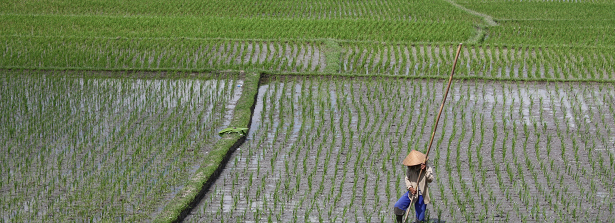Improve Indonesia’s rice production by biological crop protection

Duration: August 2014 – August 2017
Project information
Aim: Identify which available biological control agents are compatible or even act synergistically to build a resilient and sustainable crop protection system against the main plant pathogens in rice under lowland tropical conditions in Indonesia.
Objective: Increased output, contribution to higher incomes and diminishing negative environmental effects contributing to food safety and security. Diminish negative environmental effects by using biological instead of chemical crop protection products.
Method: Design a test framework. Develop and test the optimal resilient and sustainable crop protection system at two locations. Develop products up to commercialization phase.
Country: Indonesia.
Dutch policy goal: Increased sustainable agricultural production.
Progress reports
Year 2: To stimulate a more sustainable rice cultivation in Indonesia, the project team has first described the interactions among rice and the two bacteria that cause the most problematic diseases in rice: Xanthomonas oryzae and Rhizoctonia solani. The interactions included those between the bacteria and rice, bacteria and growth-medium, bacteria and local microbiology, and above- and belowground pathogens and biocontrol agents, organisms that can help reduce the pressure of Xanthomonas and Rhizoctonia. This first analysis was used to determine the tools needed to monitor diseases and the effects of biocontrol agents in greenhouse experiments and in the field. The team also identified the main rice varieties in Indonesia, the climate conditions and growing seasons, the crop protection measures, the yields and the main pests and diseases in rice.
Field trials
The project team involved a local research institute, Universitas Gadjah Mada (UGM) in Yogyakarta, to execute local research. Together with UGM, the researchers selected two locations for field trials both in Central Java. To test the framework, they also designed an experiment with diverse biological agents and Xanthomonas and Rhizoctonia in pots at the quarantine greenhouses of Wageningen UR Greenhouse Horticulture in Bleiswijk, the Netherlands. Moreover, they validated genetic markers to detect diverse biological agents in the soil. Next steps will include field experiments with biological agents at the two test locations in Indonesia. Below-ground analysis will not be executed anymore. The research primarily focuses on Xanthomonas oryzae and Rhizoctonia solani, which are both above-ground diseases.
Year 3: Rice is Indonesla’s dominant staple crop. The 25 million Indonesians involved in rice farming suffer high losses due to plant diseases. Traditionally, chemica! products are used for erop protection which is impacting the environment and people. This research identifies which biologica! erop protectlon solutions improve output while diminishing negative environmental effects. Along with the chemica! pesticides, this integrated solution with biologica! control will provide the total solution to the farmers to lmprove farm productivity. Field tests are executed in the Yogyakarta (Centra! Java) and Subang region (West Java) on a modern hybrld and a local variety. Slmultaneously, indoor tests at the quarantlne research facilitles of Wageningen Plant Research in Bleiswijk, The Netherlands have been executed. Following the evaluatlon of the results of the outdoor and Indoor tests, the lntegrated pest management treatment has been adjusted and upscale trials for the commercialization phase are currently being implemented.
Final report
Not available yet.
